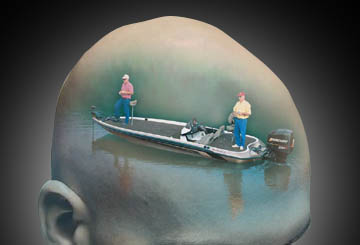Handling the psychological storms that weather can create

Weather, in its varied and oft-changing forms, represents one of the greatest mental challenges for anglers. Tournament competitors as well as weekend bait dunkers know from experience that primo weather conditions can put a person in a fish-catching mood, whereas lousy weather can do just the opposite. While it’s not clear exactly how weather affects fish and fish movements, it’s very obvious that weather has a profound effect on those who chase fish!
Anglers have historically used bad weather to explain their lack of success. As tournament participants have seen, however, even under the worst weather circumstances imaginable, somebody (often more than one somebody) brings in a big bag of fish.
Still, if you hope for a good wind to make your fish go and you get a flat, calm day, or if a fog delay threatens to eliminate your early-morning topwater bite, you are at risk to let weather conditions seriously disrupt your mental attitude.
You can’t change the weather, so … ?
Readers of this column know that I emphasize self-awareness/self-understanding as a foundational dimension of competitive success. With that in mind, it just makes good sense to recognize your prevailing attitude toward weather and understand how it helps or hurts your fishing. Let’s take a look at a few different attitudinal approaches to weather and see how to keep bad weather from creating problematic emotional storms.
The Admiral Farragut attitude
“Damn the torpedoes – full speed ahead!” When it comes to dealing with bad weather, some anglers follow the famous words of Admiral David Farragut. If this is your attitude, you are likely to stay out fishing in the middle of hailstorms, run straight to your spot in spite of headwinds or crosswinds, and practice all day in a cold rain regardless of the feeling or lack thereof in your fingers. Your unspoken attitude goes something like this: “I’m not going to let bad weather affect me … at all! I’m going to fish where and how I want to fish, thank you very much!”
Such an attitude likely reflects courage, tenacity and fortitude. These characteristics can carry you a long way. In some situations, they can help you win tournaments, like they did for my friend Ralph. A few years back we fished a tournament during a steady 25-mph wind. Throughout the day, I saw Ralph bobbing up and down, trying to fish docks on the windward shore. If you’ve done this yourself, you know it’s a miserable experience (If you haven’t, trust me, it is). At the weigh-in, Ralph bested the second-place guy by more than 5 pounds. When I asked Ralph why he went to all the trouble to fish docks on the windy side of the lake, he gave me a “that’s a stupid question” look and said, “Well, Jay, that’s where the good docks are.”
However, this same attitude taken too far can get you in trouble. History tells us, you may recall, that not all of Admiral Farragut’s boats avoided the torpedoes. If you let courage, ambition and a go-for-it attitude override good judgment, you are at risk to make careless mistakes, take unnecessary chances and/or put yourself in precarious situations. I didn’t count the number of new gouges and nicks Ralph’s boat picked up during collisions with docks that day, but I can tell you I wasn’t the only one who noticed them. Pushing too hard in really ugly weather can be downright dangerous, as a survey of tournaments on Lake Erie will verify.
Your primary need, if you have an aggressive approach to dealing with bad weather, is to seek out and use the perspectives of other people to temper your full-speed-ahead style. If one or more of your fishing buddies says, “I wouldn’t do that if I were you,” you might reconsider your decision to challenge inclement weather head-on.
The Mother Nature wins attitude
At the other end of the aggressive-passive spectrum is the individual who refuses to fight the forces of weather under any circumstances. This is the kind of person who thinks that Mother Nature knows best and that the ideal route is the path of least resistance. In a best-case scenario, this reflects an accepting, tolerant, go-with-the-flow attitude, which can also help you win tournaments. You have probably heard the same stories I have about intense weather that forced competitors off their best spots and into protected areas that turned out to hold the tournament-winning fish.
Of course, an overly timid attitude toward bad weather can seriously restrict the amount of water available to you. Deciding in advance to avoid severe weather conditions may constrict your thinking and eliminate the possibility of finding creative options or envisioning possibilities that more adventuresome anglers might discover. So maybe there’s too much wind for anyone to fish a drop-shot rig in the middle of the lake, but if you know the fish are there, perhaps you should challenge yourself to figure out another method to catch them.
If you have a passive approach to dealing with what Mother Nature dishes out, you primarily need to reevaluate your willingness to take calculated risks. There are probably some seminasty weather conditions in which you could make a commitment to face the elements and experiment with new techniques rather than reflexively head for shelter.
The TV weatherman attitude
We have all met these people. They are the weather-data dudes, the ones who can recite air temperature, wind speed, water temperature and barometric pressure statistics to three decimal points. And for some reason, they often feel compelled to share with you what the weather has been like every day for the last six weeks. In a positive sense, such individuals are great at paying close attention to current conditions and anticipating upcoming weather patterns. They may also be quick to make adjustments in their fishing tactics, depending on what is or will soon be happening with the wind, the cloud cover, the barometer, and so forth.
Such individuals, however, can also spend an excessive amount of time overanalyzing weather variables. They may spend so much time focusing on weather conditions that they lose track of other key elements. There are several theories about how various weather circumstances might affect fish behavior; though as competitive anglers know, such theories don’t always hold up on tournament day.
If you are a weather-data connoisseur, the most important word to keep in mind is balance. The wind shifting from 5 to 10 mph, or the sky cover changing from partly to mostly cloudy, may not be the most critical component of your fishing day. Since you believe in facts and numbers, be sure to keep a fishing log that shows how your fishing success relates to different weather conditions at various times of the year.
And the key, once again, is – mental flexibility.
In building an attitude toward weather, it is perhaps best to steer a middle course. In building an attitude toward weather, it is perhaps best to steer a middle course. That is, be reasonably brave, somewhat cautious and open-minded, so that even if the weather isn’t, at least your mind can be clear, stable and calm. 
————————————————–
Dr. Fish, also known as Jay T. McNamara, Ph.D., L.P., also known as Dr. Fish, has just finished his book, “The Psychology of Exceptional Fishing.” You can order it by contacting Jay via e-mail at this address: [email protected].
————————————————–
Jay T. McNamara, Ph.D., L.P., is a psychologist, who is also an avid bass and walleye angler. With more than 26 years of professional experience complemented by participation in competitive fishing at local and national levels, he is uniquely qualified to illustrate how performance psychology principles apply to tournament fishing.